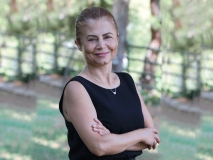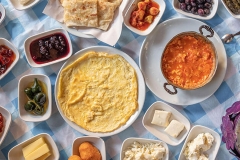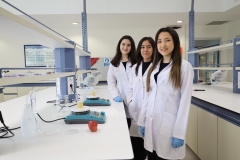
FACULTY OF ENGINEERING
Department of Food Engineering
MATH 208 | Course Introduction and Application Information
| Course Name |
Introduction to Differential Equations II
|
|
Code
|
Semester
|
Theory
(hour/week) |
Application/Lab
(hour/week) |
Local Credits
|
ECTS
|
|
MATH 208
|
Fall/Spring
|
2
|
2
|
3
|
5
|
| Prerequisites |
|
|||||||
| Course Language |
English
|
|||||||
| Course Type |
Elective
|
|||||||
| Course Level |
First Cycle
|
|||||||
| Mode of Delivery | - | |||||||
| Teaching Methods and Techniques of the Course | Problem SolvingCase StudyQ&ASimulation | |||||||
| Course Coordinator | - | |||||||
| Course Lecturer(s) | ||||||||
| Assistant(s) | ||||||||
| Course Objectives | This course includes classification, applications and solution methods of partial differential equations. Fourier series for periodic functions, solution of heat and wave equation by separation method, solution methods of Laplace equation in rectangular and polar coordinates are aimed. |
| Learning Outcomes |
The students who succeeded in this course;
|
| Course Description | In this course basic concepts and classification of partial differential equations will be discussed. The heat, wave and Laplace equation will be given and the solution methods will be taught. |
|
|
Core Courses | |
| Major Area Courses | ||
| Supportive Courses | ||
| Media and Management Skills Courses | ||
| Transferable Skill Courses |
WEEKLY SUBJECTS AND RELATED PREPARATION STUDIES
| Week | Subjects | Related Preparation |
| 1 | Mathematical background for the study of partial differential equations | Erwin Kreyszig, “Advanced Engineering Mathematics”,10Th Edition, (John Wiley and Sons), Sections 9.5, 9.7, 9.8 |
| 2 | Description of partial differential equations. Classification and model definitions. First order partial differential equations | Yehuda Pinchover and Jacob Rubistein, “An Introduction to Partial Differential Equations”, (Cambridge University Press, 2005), Sections 1.1. to 1.7 |
| 3 | Modelling first order partial differential equations. Solving by the method of characteristics | Yehuda Pinchover and Jacob Rubistein, “An Introduction to Partial Differential Equations”, (Cambridge University Press, 2005), Sections 2.1. to 2.4 |
| 4 | Modelling continuity equation, wave equation and traffics flow and applications | Yehuda Pinchover and Jacob Rubistein, “An Introduction to Partial Differential Equations”, (Cambridge University Press, 2005), Sections 2.1. to 2.4 |
| 5 | Partial Laplace transform. Solving first order partial differential equations by partial Laplace transform. | “http://www.math.ttu.edu/~gilliam /ttu/s10/m3351_s10/c15_laplace_trans_pdes.pdf” Chapter 15 |
| 6 | Heat Equation. Solution by separation of variables. Existence and Uniqueness of Solutions. | Kent Nagle, Edward B. Saff and Arthur David Snider, “Fundamentals of Differential Equations and Boundary Value Problems” 6th Edition, (Pearson, 2011), Section 10.5. |
| 7 | Heat and diffusion equations examples and interpretation of the solution results | Kent Nagle, Edward B. Saff and Arthur David Snider, “Fundamentals of Differential Equations and Boundary Value Problems” 6th Edition, (Pearson, 2011), Section 10.5-10.7 |
| 8 | Midterm Exam I | |
| 9 | The wave equation. Solution by seperation of variables. Existence and Uniqueness of Solutions. | Kent Nagle, Edward B. Saff and Arthur David Snider, “Fundamentals of Differential Equations and Boundary Value Problems” 6th Edition, (Pearson, 2011), Section 10.6. |
| 10 | The Laplace's equation in rectangular coordinates. Solution by separation of variables. Existence and Uniqueness of Solutions. | Kent Nagle, Edward B. Saff and Arthur David Snider, “Fundamentals of Differential Equations and Boundary Value Problems” 6th Edition, (Pearson, 2011), Section 10.7. |
| 11 | Laplace's equation in polar coordinates and its solution by the method of separation of variables. | Kent Nagle, Edward B. Saff and Arthur David Snider, “Fundamentals of Differential Equations and Boundary Value Problems” 6th Edition, (Pearson, 2011), Section 10.7. |
| 12 | Solving second order partial differential equations by partial Laplace transform. | “http://www.math.ttu.edu/~gilliam/ttu/s10/m3351_s10/c15_laplace_trans_pdes.pdf” Chapter 15 |
| 13 | Numerical solutions of heat equation | David R. Kincaid and E. Ward Cheney, “Numerical Analysis”, (Brooks/Cole, 1991), Sections: 9.1,9.2 |
| 14 | Numerical solutions of wave equation | David R. Kincaid and E. Ward Cheney, “Numerical Analysis”, (Brooks/Cole, 1991), Sections: 9.1,9.2 |
| 15 | Semester review | |
| 16 | Final exam |
| Course Notes/Textbooks | Kent Nagle, Edward B. Saff and Arthur David Snider, “Fundamentals of Differential Equations and Boundary Value Problems” 6th Edition, (Pearson, 2011), ISBN-13: 978-0321747747. |
| Suggested Readings/Materials | Yehuda Pinchover and Jacob Rubistein, “An Introduction to Partial Differential Equations”, (Cambridge University Press, 2005), ISBN-13:978-0-521-84886-2 Erwin Kreyszig, “Advanced Engineering Mathematics”,10Th Edition, (John Wiley and Sons), ISBN: 978-0-470-45836-5 David R. Kincaid and E. Ward Cheney, “Numerical Analysis”, (Brooks/Cole, 1991), ISBN-10: 0-534-13014-3 |
EVALUATION SYSTEM
| Semester Activities | Number | Weigthing |
| Participation | ||
| Laboratory / Application | ||
| Field Work | ||
| Quizzes / Studio Critiques | ||
| Portfolio | ||
| Homework / Assignments |
1
|
20
|
| Presentation / Jury | ||
| Project | ||
| Seminar / Workshop | ||
| Oral Exams | ||
| Midterm |
1
|
30
|
| Final Exam |
1
|
50
|
| Total |
| Weighting of Semester Activities on the Final Grade |
2
|
50
|
| Weighting of End-of-Semester Activities on the Final Grade |
1
|
50
|
| Total |
ECTS / WORKLOAD TABLE
| Semester Activities | Number | Duration (Hours) | Workload |
|---|---|---|---|
| Theoretical Course Hours (Including exam week: 16 x total hours) |
16
|
4
|
64
|
| Laboratory / Application Hours (Including exam week: '.16.' x total hours) |
16
|
0
|
|
| Study Hours Out of Class |
14
|
3
|
42
|
| Field Work |
0
|
||
| Quizzes / Studio Critiques |
0
|
||
| Portfolio |
0
|
||
| Homework / Assignments |
1
|
10
|
10
|
| Presentation / Jury |
0
|
||
| Project |
0
|
||
| Seminar / Workshop |
0
|
||
| Oral Exam |
0
|
||
| Midterms |
1
|
14
|
14
|
| Final Exam |
1
|
20
|
20
|
| Total |
150
|
COURSE LEARNING OUTCOMES AND PROGRAM QUALIFICATIONS RELATIONSHIP
|
#
|
Program Competencies/Outcomes |
* Contribution Level
|
||||
|
1
|
2
|
3
|
4
|
5
|
||
| 1 | Being able to transfer knowledge and skills acquired in mathematics and science into engineering, | |||||
| 2 | Being able to identify and solve problem areas related to Food Engineering, | |||||
| 3 | Being able to design projects and production systems related to Food Engineering, gather data, analyze them and utilize their outcomes in practice, | |||||
| 4 | Having the necessary skills to develop and use novel technologies and equipment in the field of food engineering, |
|||||
| 5 | Being able to take part actively in team work, express his/her ideas freely, make efficient decisions as well as working individually, |
|||||
| 6 | Being able to follow universal developments and innovations, improve himself/herself continuously and have an awareness to enhance the quality, |
|||||
| 7 | Having professional and ethical awareness, |
|||||
| 8 | Being aware of universal issues such as environment, health, occupational safety in solving problems related to Food Engineering, | |||||
| 9 | Being able to apply entrepreneurship, innovativeness and sustainability in the profession, |
|||||
| 10 | Being able to use software programs in Food Engineering and have the necessary knowledge and skills to use information and communication technologies that may be encountered in practice (European Computer Driving License, Advanced Level), |
|||||
| 11 | Being able to gather information about food engineering and communicate with colleagues using a foreign language ("European Language Portfolio Global Scale", Level B1) |
|||||
| 12 | Being able to speak a second foreign language at intermediate level. |
|||||
| 13 | Being able to relate the knowledge accumulated during the history of humanity to the field of expertise |
|||||
*1 Lowest, 2 Low, 3 Average, 4 High, 5 Highest
NEWS |ALL NEWS

Online 'weight loss' period
The increase in time spent at home to protect against coronavirus and the habit of sedentary life caused a "weight" crisis for

The Aegean is distributing healing
The fear of catching coronavirus, which is transmitted to more than 73 million people worldwide, and the increase in flu cases with

Pandemic changed eating habits
The coronavirus, which negatively affected life in many issues from daily life to work and social interaction, also changed the eating habits

HIGH-SCHOOL STUDENTS EXPERIENCED COLLEGE IN FOOD ENGINEERING LABORATORIES
“SCIENCE DAYS” event was organized by Department of Food Engineering in Izmir University of Economics. This event aimed to teach science in

STUDENTS OF FOOD ENGINEERING DEPARTMENT DEVELOPED 'ATRICHOKE PASTE' FOR FIRST INTERNATIONAL URLA ARTICHOKE FESTIVAL
Most of the attenders enjoyed the 'Artichoke Paste', developed by the students of Food Engineering Department.

MAINTAINING HEALTHY EATING HABITS DURING HOLIDAY SEASON!
As the students got their report cards and started a long summer holiday, the experts pointed out the importance of not to


